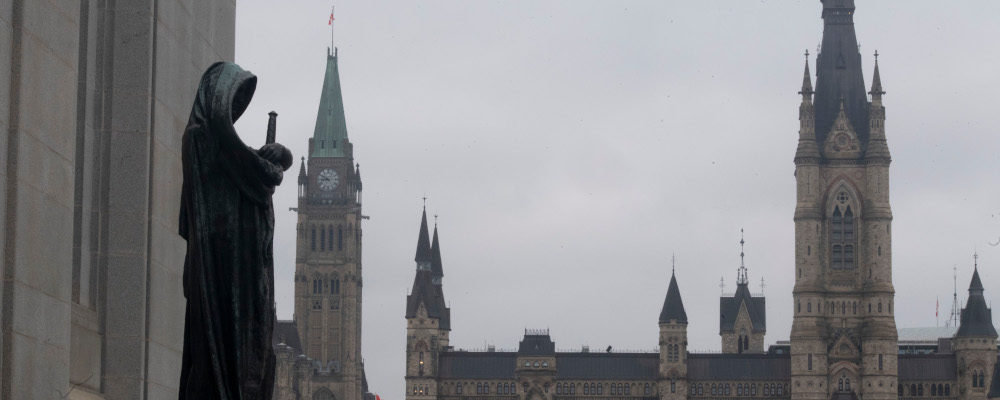Forty years ago, Canada changed from being one kind of liberal democratic polity to another. Put simply, the enactment of the Canadian Charter of Rights and Freedoms made us at least a little bit more liberal and a little bit less democratic. While our courts had been policing the divide between federal and provincial jurisdiction since Confederation, the Charter gave them novel powers to limit the state’s power to tread on individual rights. Canadians seem pleased with the change: surveys consistently show the popularity of both the Charter and the judges who interpret it.1“More than four-in-five (84%) say the Charter has been good for Canada since it was adopted in 1982. Among the 16 per cent who say it has been bad, more than half (58%) hold an unfavourable view of the Supreme Court.” https://angusreid.org/supreme-court/#:~:text=More%20than%20four%2Din%2Dfive,view%20of%20the%20Supreme%20Court.
But at the time it was introduced (and for many years thereafter) skeptics of liberalism on both the Left2The Charter of Rights and the Legalization of Politics in Canada and Right3The Charter Revolution and the Court Party were strongly critical of the Charter and the individualist, minoritarian values it embodied. Progressives were concerned that, as with the United States Supreme Court during its early 20th Century “Lochner” era, judges would constitutionalize laissez-faire economics and thwart welfare-state regulation and redistribution. Conservatives feared, in contrast, that the Charter would erode traditional, communitarian norms and institutions and elevate individual autonomy and self-expression above consensus morality and social order. Their bête noire was the jurisprudence of a later U.S. Supreme Court: the 1960s “Warren” court and its expansive conceptions of liberty and privacy in the realms of sexuality, expression, and criminal justice. What Charter critics on both ends of the political spectrum feared, in other words, was judicial activism: the usurpation of lawmaking by a tiny, elite cadre of unrepresentative and unaccountable judges.
For the most part, these fears proved unfounded. As Malcolm Lavoie recently noted,4Our lack of property rights make Canadians uniquely vulnerable to digital jail the Charter’s architects made a deliberate decision to exclude property rights. This omission, coupled with the absence of any other express reference to economic liberty, left courts with little ammunition to constrain the welfare state. And to the extent that facially non-economic rights (such as section 8’s right to be free from unreasonable searches) could have been interpreted to blunt regulatory enforcement, the Supreme Court of Canada has consistently demurred, permitting regulators to intrude on privacy with few of the constraints faced by police in criminal investigations.
Social conservatives had greater reason for concern. The Charter’s unabashedly liberal language and provenance credibly threatened majoritarian attempts to limit individual autonomy on moral grounds. But looking back after four decades, we can see that the Supreme Court has been reluctant to get too far ahead of public opinion on contentious moral issues. The Court struck down the Criminal Code’s abortion provisions, for example, on relatively narrow procedural grounds, leaving Parliament significant room to restrict access had it chosen to do so. The Court also declined to overturn the Code’s prohibition on marijuana possession, expressly excluding J.S. Mill’s arch-liberal “harm principle” from the Charter’s ambit. And even when the Court has used the Charter to strike down morally freighted laws, as in the context of homosexuality, assisted suicide, and prostitution, it has largely tracked evolving majority norms, not bucked them (see here, here, and here).
In short, the decision to constitutionalize individual rights in a manifestly liberal fashion has not turned Canada into a haven for neoliberalism, libertarianism, or libertinism.
Over the next forty years, the threat that Charter adjudication poses to our constitutional democracy is more likely to stem from the withering of liberal norms, not their overextension. As illiberal strains of progressive and conservative legal theory become increasingly popular, there is a risk that Charter jurisprudence will increasingly echo the hyperpolarized, identitarian power struggles emerging in our political culture (and which are even more pronounced in the United States).
While ideological interest groups have always sought to pursue their agendas in the courts, Canadian judges have largely resisted the lure of partisan adjudication. This is not to say that judges’ policy preferences and political philosophies have no influence over their decisions, especially in contentious constitutional cases. But in the main, our courts have acted as if the Charter’s text, history, and liberal philosophical roots impose substantive constraints on their decisions.
Two contentious cases pending before the Supreme Court will help signal whether this desirable state will continue. In R v Sharma, the Court will decide whether Parliament’s 2012 decision to remove conditional sentences as an option for a certain class of offences violates the Charter. Conditional sentences, which were first introduced in 1996, are controversial because they allow offenders who would otherwise spend time in prison to serve their sentences in the community, typically under some form of house arrest. But Parliament had good reasons, in our view, to minimize the use of incarceration, including reducing public expenditures, fostering successful community reintegration, and mitigating Indigenous overrepresentation in prison. Crucially, among other restrictions, judges may not award conditional sentences if doing so would pose a significant danger to the public.
It is one thing to believe that conditional sentences are a desirable option for many offences. But it is quite another to conclude that they are constitutionally mandatory. In one of the most nakedly activist decisions in recent memory, a 2:1 majority of the Ontario Court of Appeal found in Sharma that the decision to narrow their availability violated Indigenous Canadians’ section 15 Charter right to equality. Because Indigenous offenders are more likely to be incarcerated than non-Indigenous offenders, the court found, the removal of the conditional sentence option exacerbated their preexisting disadvantage in a discriminatory manner.
The majority’s reasoning violates a fundamental tenet of constitutional law: absent a constitutional amendment, a legislature cannot bind a future version of itself. As Justice Miller observed in his dissent, the majority circumvented this requirement by effectively holding that when one legislature passes an ameliorative provision, and a future legislature scales it back, any adverse impact on a minority population will violate the Charter. This would turn lawmaking into a one-way ratchet: once a benefit is conferred on a disadvantaged population, it can never be taken away.
This departure from a basic norm of constitutionalism was exacerbated by the majority’s indeterminate and overbroad conception of the Charter’s equality guarantee. It is true that curtailing the availability of conditional sentences could negatively affect Indigenous offenders. But so would almost any attempt to impose more punitive sentences, not only for Indigenous offenders but also for any other overrepresented minority. And while the majority in Sharma limited its holding to the rescinding of beneficial legislation, its logic is readily extendable to any governmental decision shown to disproportionately affect a disadvantaged group. Under this theory of equality rights, the scope for legislative action would be dramatically diminished.
The second pending case concerns the constitutionality of Parliament’s reply to the Supreme Court’s 1994 decision in R v Daviault. In that case, the Court found that section 7 of the Charter protects a basic tenet of liberalism: the state cannot punish a person for involuntary conduct. Daviault argued that he could not be convicted of sexual assault because his ingestion of copious amounts of alcohol prevented him from being aware of what he was doing when he assaulted a disabled 65-year-old woman. The Court ordered a new trial because the prevailing common law rule unconstitutionally barred him from showing that his intoxication rendered his actions involuntary.
It is doubtful based on current medical science that alcohol alone can cause this kind of “automatistic” state, and Daviault would likely have been convicted had the complainant not died before his retrial. The decision nevertheless provides a defence to individuals who can prove that intoxication caused them to lose conscious awareness of their actions.
The public reaction to Daviault was harsh, and Parliament swiftly responded with section 33.1 of the Code, which takes away the intoxication defence for many violent crimes, including sexual assault. In R v Sullivan, a unanimous Ontario Court of Appeal concluded that this provision violated the Charter for essentially the same reasons articulated in Daviault. It is contrary to the principles of fundamental justice, Justice Paciocco wrote, “to remove the voluntariness element from an offence.”
The Crown nevertheless argued that the law should be upheld as a reasonable limitation of rights under section 1 of the Charter. To establish such a justification, the government must demonstrate that the law’s ability to achieve a pressing objective is proportionate to the infringement of the Charter right at issue. In the Crown’s view, section 33.1 met this standard because it is necessary to uphold “the security of the person and equality rights of others, particularly women and children, from violent crimes at the hands of intoxicated offenders.”
The court rejected the Crown’s assertion. It was correct in doing so. Because it prohibits people from claiming that they acted involuntarily, regardless of whether their consumption was “extreme” or otherwise criminally culpable, section 33.1 cannot have a valid deterrent or denunciatory effect. The exceedingly remote possibility of committing a crime while in an automatistic state is unlikely to influence one’s choice of whether to become intoxicated. Nor is the mere act of becoming voluntarily intoxicated imbued with sufficient moral culpability to be deserving of criminal punishment. The two accused in Sullivan, for example, committed bizarre and unmotivated offences after taking substances not known to be associated with violent crime. One ingested magic mushrooms at a party; the other tried to commit suicide by taking an overdose of a prescription smoking cessation drug.
If Parliament wishes to denounce and deter dangerous intoxication without running roughshod over the fundamental liberal principle of individual agency, there is an obvious alternative. As proposed in Daviault and Sullivan, it could create a separate offence of criminal intoxication. This would apply to cases of self-induced intoxication causing harm to others meeting the minimum standard of fault for criminal offences: a marked departure from the standard of care expected of a reasonable person.
The Sharma and Sullivan appeals represent attempts, one by an offender and one by the state, to subvert the Charter’s liberal logic by invoking inchoate threats to equality, victimization, and social order. These attempts should be rejected. Over the past four decades, the Charter has rightly been interpreted to permit the state to pursue a wide range of ameliorative, redistributive, and communitarian goals—as long as it does not unjustifiably limit fundamental individual rights. We must resist the urge to turn Charter adjudication into yet another battlefield in the culture wars. Doing so would make Canada both less liberal and less democratic.




